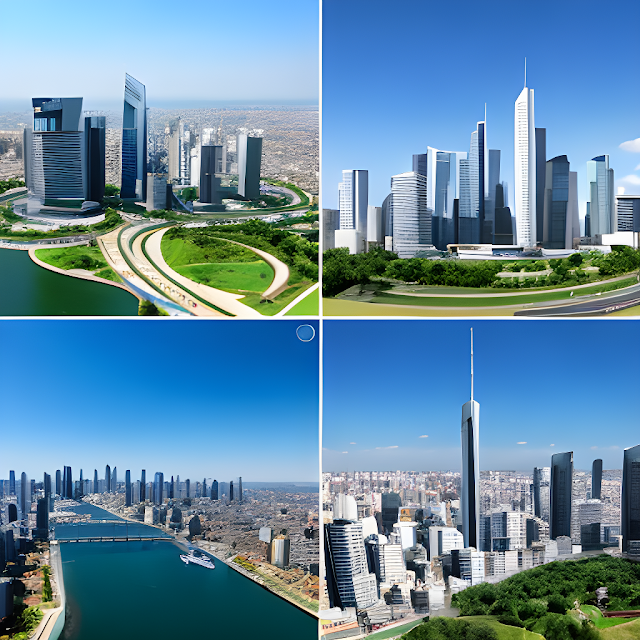Summary:
The concept of smart cities is transforming urban landscapes worldwide, offering innovative solutions to the challenges faced by rapidly growing urban populations. These cities of the future leverage cutting-edge technologies, with a primary focus on the Internet of Things (IoT) integration, to enhance urban living, optimize resource utilization, and promote sustainable urban development. This article explores the key features of smart cities, the role of IoT in their development, and the potential benefits they offer in creating more livable, efficient, and eco-friendly urban environments.
Introduction:
As the global population continues to migrate towards urban centers, cities are facing unprecedented challenges related to infrastructure, transportation, energy consumption, and environmental sustainability. In response to these mounting issues, the concept of smart cities has emerged as a transformative approach to urban planning. These cities leverage advanced technologies like the Internet of Things (IoT), artificial intelligence (AI), data analytics, and cloud computing to create a more interconnected, efficient, and sustainable urban environment.
Defining Smart Cities:
A smart city is an urban ecosystem that integrates digital technologies and IoT devices to improve the quality of life for its residents, enhance operational efficiency, and reduce environmental impact. By collecting and analyzing data from various sources, smart cities can optimize services, streamline processes, and make better-informed decisions that benefit both the city administration and its citizens.
IoT Integration in Smart Cities:
At the heart of smart cities lies the seamless integration of IoT devices. These interconnected devices, ranging from sensors and actuators to cameras and meters, collect real-time data on various aspects of urban life. IoT networks facilitate the exchange of data, allowing city authorities to monitor and manage everything from traffic flow and waste management to energy consumption and public safety.
Sustainable Urban Development:
Sustainability is a core principle driving the development of smart cities. By adopting eco-friendly practices achieve sustainable urban development. IoT integration plays a pivotal role in this pursuit, as it enables the smart monitoring and management of resources and infrastructure. Here are some key areas where IoT integration promotes sustainable urban development:
a. Energy Management: IoT-enabled smart grids allow cities to optimize energy distribution, reduce energy wastage, and integrate renewable energy sources. Smart meters enable real-time monitoring of energy consumption in buildings, helping residents and businesses make informed decisions about their usage patterns and reduce their carbon footprint.
b. Efficient Transportation: Smart transportation systems equipped with IoT devices can alleviate traffic congestion, minimize emissions, and enhance public transportation services. IoT-powered sensors gather data on traffic flow, parking availability, and public transit usage, allowing authorities to make data-driven decisions to improve mobility within the city.
c. Waste Management: IoT sensors in waste bins and collection vehicles enable optimized waste collection routes, reducing fuel consumption and operational costs. Additionally, real-time monitoring helps identify overflowing bins, enabling timely collections and minimizing litter on the streets.
d. Water Management: IoT-based water management systems help monitor water usage, identify leaks, and optimize irrigation systems. By conserving water resources, smart cities contribute to environmental preservation and ensure sustainable access to clean water for all residents.
e. Environmental Monitoring: IoT devices such as air quality sensors and weather stations continuously monitor environmental conditions. This data helps authorities implement measures to reduce pollution levels, address climate change impacts, and protect the health of citizens.
Enhanced Urban Services:
Smart cities leverage IoT and data analytics to enhance the quality and efficiency of urban services. Here are some ways IoT integration benefits urban services:
a. Public Safety: IoT-powered surveillance cameras, facial recognition technology, and sensors can improve public safety by detecting potential threats and facilitating faster emergency response times.
b. Healthcare: IoT devices enable remote patient monitoring, wearable health trackers, and smart healthcare systems that enhance healthcare accessibility and efficiency.
c. Education: Smart classrooms equipped with IoT devices enhance the learning experience by providing interactive and personalized education.
d. Government Services: IoT-based systems streamline administrative processes, allowing citizens to access services more efficiently and reducing bureaucratic delays.
Citizen Engagement and Participation:
Smart cities prioritize citizen engagement and participation by fostering two-way communication between residents and city authorities. IoT-enabled platforms and mobile apps allow citizens to report issues, provide feedback, and actively participate in decision-making processes. This inclusivity promotes a sense of ownership and community cohesion, ultimately leading to a more harmonious urban environment.
Challenges and Considerations:
While the vision of smart cities is promising, there are several challenges that need to be addressed. Privacy and data security concerns require robust frameworks to protect citizens' sensitive information. Moreover, the digital divide must be overcome to ensure equal access to smart city technologies for all residents, regardless of socioeconomic status.
Conclusion:
Smart cities of tomorrow represent a groundbreaking paradigm in urban development. With IoT integration at the core of their evolution, these cities harness data and technology to create sustainable, efficient, and citizen-centric urban environments. As cities continue to grow and face increasing challenges, the smart city approach holds immense potential to transform our urban landscapes for the better, fostering a more connected, eco-friendly, and livable future for all. To achieve this vision, collaboration between governments, technology providers, and citizens will be essential in shaping the cities of tomorrow.

Post a Comment for "Smart Cities of Tomorrow: IoT Integration and Sustainable Urban Development"